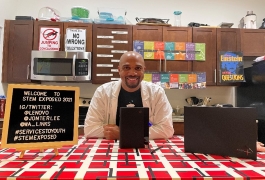How an Individual Development Plan Can Help You Advance Your Career Goals

What do you want to do when you grow up? It’s easy to shrug off this question from childhood as being important but irrelevant: I’m in school, I’ll figure it out, you might think. But whether you’ve got your eyes on a career as a researcher, a chemistry teacher, a world-renowned dog trainer with a chemistry degree, or if you just have no idea—you’re gonna need a plan.
A good individual development plan (IDP) will allow you to capture your values and abilities, your interests and goals, and your action plan. IDPs can be used to help you reflect on your current self, describe your hoped-for future self, and learn about the paths to connect the two. Students from undergrad to PhD track their growth and use it to work with mentors, schedule professional training opportunities, and to find jobs that match their skills.
“The main goal is for you to gain control over your career,” says Corrie Kuniyoshi, a senior program manager with ACS who helped create a tool called ChemIDP for students in the chemical sciences. Kuniyoshi suggests that one of the most important aspects of creating an IDP is agency—the act of putting yourself in the driver’s seat.
Whether you update it weekly with detailed accomplishments, or just major milestones, an IDP will improve your self-awareness and grasp of the careers available to you. There are several ready-made IDP tools available online for you to personalize, but you can also create one yourself.
Here are the top five ways to use an IDP to your advantage:
1. Gain self-awareness
Nobody can force you to use an IDP. But a good reason to do one is simple: An IDP is a personal assessment of yourself and who you want to be. It becomes a powerful tool if you commit to using it honestly. In fact, the most valuable benefit of using an IDP occurs at the moment you begin with self-awareness.
“It's really easy to lose sight of the bigger picture of why you're doing this, and what comes next,” says Brandi Cossairt, a professor of chemistry at the University of Washington. Cossairt regularly encourages her students to create IDPs.
Knowing your values, strengths, weaknesses, and interests is the first step to figuring out what you want out of a career, how to chase a career intentionally, and how to develop skills to excel. IDPs give you the framework to understand the present and future professional versions of self. An IDP prompts you with specific questions relevant to your career journey. You can weigh your abilities in specific areas such as lab skills in nanotechnology and oral communication. As you identify and record your skills, you can refer to the IDP to highlight skills on a graduate school or job application. And you can identify weak areas where you need to grow.
Answering questions related to your values gets you to think about what characteristics make certain jobs more appealing to you than others. How much do you value career stability? Do you prefer a rapidly changing environment or a place with more stability? If you know you'll be happier in a job with a lot of career stability, an IDP is a place to remind yourself that a large company, the government, or a tenured faculty position is ideal. But if you prefer a rapidly changing work environment, you might plan for a career at a start-up company or in consulting.
“One thing that I always try to reinforce is that no two students’ IDPs ought to look the same,” says Cossairt. “They're about you. You’re a unique person and you have different things that you want out of life.” Cossairt advises students to really think about themselves, rather than the expectations of the average student in their situation. “Make it personal,” she says.
If you start with a set career path or desired expertise, great! IDPs will outline the specific skills that you should hone throughout that journey. If not, that’s fine too. IDPs show you how your self-assessed values, skills, and interests align with various paths. You might realize that you’re equally motivated by public engagement, altruism, and a love of biochemistry, for example. This could suggest that a nonprofit biomedical research firm that balances these skills and aspirations fits your profile. It could also help you understand why some sought-after, high-paying job you qualify for doesn’t appeal to you.
Of course, there is more to you as a person than being an altruist who self-assesses as weak in rheological analysis and strong in statistics and data visualization. An IDP doesn’t capture your personal generosity, kindness, or hobbies. But assessing yourself this way makes it easier to grow professionally. If you really don’t know how to measure your skills in a certain area, talk to a mentor or colleague. It still counts as self-awareness if someone helps you.
2. Organize your development with SMART goals
Cossairt has used IDPs since she was a PhD student. Now she’s a professor and advises her graduate students to do the same. “It gives students a concrete tool to help them organize their goals,” she says. It enables them “to keep track of what they've accomplished and what they want to accomplish during their PhD.”
The same benefits hold true for undergraduates thinking about career planning. “You have one primary focus as an undergrad: take classes and do well,” Cossairt says. “But then there's a lot of other professional stuff that you could accomplish if you had a way to plan that from the beginning.”
Once you’ve prioritized which of your skills you want to improve, it’s time to act. Each plan should revolve around Specific, Measurable, Achievable, Realistic, and Timely (SMART) goals. Setting SMART goals makes it easier to focus on doing what you need to do and prevents you from creating unreasonable goals or abstract expectations.
How can an IDP help you set SMART goals? Think of ways to lean on your strengths to improve on your weaknesses. For example, suppose you want to use your chemistry training to work in science policy, an area in which you have far less experience. You have excelled giving presentations about your physical chemistry research, but your network of contacts is limited and does not include those in science policy. Challenge yourself to present at a conference and meet 20 new people. Read and write about how topics in chemistry that interest you should shape public policy, such as how emphasizing green chemistry benefits the environment and human health, for example. You can also apply to science policy internships or graduate programs.
Alternatively, suppose you hope to be a research chemist for a battery technology company, but all your technical experience deals with computer models. You can widen your base of knowledge by finding an internship or research opportunity that provides hands-on lab experiences.
There’s no shortage of chances to become a better chemistry professional. Mentor programs, independent research, internships, and other experiences give you the space to focus on your personal goals in ways that coursework cannot.
“I try to emphasize to undergraduate students: it's not so important what your major is,” says Michael Ashby, a professor of chemistry at the University of Oklahoma, who led an effort to incorporate IDPs into the graduate curriculum at his university. It’s more important to develop the skills you’ll need after you get your degree—and your major may not do that.
“That's where the IDP comes in,” says Ashby. “That's where you design extracurricular activities that are necessary for you to fully develop and mature in time for graduation.” You can learn laboratory skills relevant for graduate school, clinical skills relevant for medical or pharmacy programs, or leadership skills that will come in handy in jobs even outside of science.
What if your self-assessment makes clear that you need to learn more about lab equipment? Attend a webinar about tools and microscopes or get hands-on research experience. You want a job communicating about science to the public, but you realize that you haven’t written anything nontechnical in years? Try writing about your projects on social media or science blogs, or submitting an abstract to present at conferences.
When advising seniors, Ashby asks them to plot out one-year goals and five-year goals. “Putting a time frame around that exercise makes it a little less daunting,” he says.
With an IDP, you can collect and organize each opportunity in one place.
SMART Goals
Specific: Be as precise as possible in defining your goal ("Learn to interpret NMR spectra of bicyclic hydrocarbons" vs. "Improve my spectroscopy skills")
Measurable: Identify how you will know if you reached your goal. ("Correctly identify the NMR spectra in my research project without help" vs. "Learn to interpret NMR spectra")
Achievable: Set goals you can achieve and create new ones as needed. ("Correctly interpret 80% of the NMR spectra produced by my research group” vs. "Become the world’s best spectroscopist")
Relevant: Make sure your goals are relevant to what you want to achieve. Improving your spectroscopy skills will not help you if your desired career relies more on X-ray diffraction.
Timely: Always put a deadline on your goals. ("Learn to interpret my group’s NMR spectra by the end of the term" vs. "Correctly interpret my group’s NMR spectra")
3. Get more out of mentorship
In the process of self-discovery and career planning, it’s important to get support and guidance from a mentor. “In order for us to grow as individuals, we need that feedback,” says Kuniyoshi. “We need that sounding board.”
“The IDP at the undergraduate level is a vehicle to have a conversation with your mentors,” says Ashby. Taking the initiative to fill out a development plan gives you a language of self-awareness, and it can help mentors guide you. You can be as active as you wish and you can change it as your interests, goals, or circumstances change.
A mentor does not have to be a research adviser or a faculty member. They can also be a peer, colleague, or a significant other who holds you accountable to advancing your plan.
ACS holds workshops at different universities and conferences to guide students through starting an IDP. However, mentors always remain critically important, especially when the motivation and excitement about your plan fades. “That is a constant struggle,” says Kuniyoshi. Combining one-on-one mentorship with an IDP can help you start the IDP process and continue it.
“That's not anything we're ever going to be able to put into any type of tool,” she says. “The support that you get can be really critical when you get stuck, and you need a push to that next step.” Using an IDP is an ongoing process.
4. Explore careers you would not have expected
Sometimes peer mentors or advisers outside academia can give an even broader view of career possibilities. Does your chemistry department recommend doing research? Maybe you have no interest in attending graduate school and you don’t see the point. That’s OK—what’s important to know is that employers outside of the sciences want to hire chemists too. Nonprofits and finance firms, for instance, frequently recruit and hire science students because they have strong analytical skills. In fact, your IDP may even recommend a career in these sectors depending on your interests and values. It’s hard to figure out what careers are within reach on your own.
When I started my PhD, I loved science journalism but had never considered that I could become a science journalist. That path only became apparent when I met people outside my lab group and department who became writers after graduate school. Even tenuous connections beyond your usual world are valuable.
5. Adapt to change
It’s worth noting that as you work toward accomplishing your goals, your interests may change too. In fact, they likely will. What used to be a dreadful requirement turns into a chance to shine. I dreaded biochemistry until learning about how nanotechnology can combat antibiotic-resistant bacteria in just months before my first year of graduate school. I ended up with a PhD in chemical and biological engineering, and now I write about public health, nature, and science. So IDPs are not static—they are a starting point for your career.
Ashby likes to compare IDPs to résumés. “A résumé is an archive of what you've done,” he says, and an IDP documents what you plan to do. “And just like a résumé, individual development plans need to be revisited periodically and updated as you get more experience.”
Of course, stuff happens. You can’t predict the future. Even students who commit themselves entirely to a goal, such as going to medical school, may not wind up achieving it. Let’s be clear that not obtaining a specified goal is fine. If this happens to you, you will be OK. But knowing that may not make the situation much easier to manage.
“How stressful might that be then, in your senior year, if you haven't made a plan?” says Ashby. “I consider this not only career development, but it’s also important for the mental health of our undergraduates.”
What your mentors want you to know is that a world of different paths is available to you with a chemistry degree. Remember that. And if you find yourself overwhelmed, “take a deep breath,” Cossairt says. “Start to look inside yourself and see which of those things really speaks to you, and then start there,” she continues. “It's amazing how much opportunity there is for you.”
IDP Tools for Scientists
ChemIDP: This ACS resource includes tools to help you assess your strengths and interests, build your strengths, explore careers, and set goals. Use this to learn more about yourself and start a conversation with your advisor on what to do next.
myIDP: AAAS developed this career resource to help you map out your personal and career growth. Like ChemIDP, it includes assessments and goal-setting tools.
myPlan: A privately-owned tool combining assessments, education, and career development.
Also check with your college or university career office to see what tools they use and what skill-building opportunities they can connect you to.




